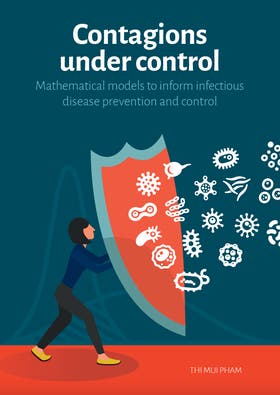Thi Mui Pham
Contagions under control

- Datum
- (Co) promotoren
- 23-02-2022
Samenvatting
In this thesis, we elucidate the important role of mathematical models for infectious disease control with a focus on the transmission of SARS-CoV-2 in the community and in hospital settings, as well as the transmission of Pseudomonas aeruginosa in intensive care units. Most important findings: Self-imposed measures (hand washing, mask-wearing, physical distancing) as a reaction to an ongoing COVID-19 epidemic can be effective in mitigating and delaying it. They can even prevent a large epidemic if they are adopted fast and if the measure has a high efficacy. Hand hygiene may be optimized by the frequency and the moment at which it is applied to reduce viral respiratory tract infections. We found that immediate hand washing after contamination is consistently more effective than at fixed time intervals. Many hospital-acquired COVID-19 cases may remain unidentified if their definition relies on a cutoff of days after symptom onset: Patients may be discharged or have a symptom onset prior to the cutoff. Screening or quarantining hospital patients at discharge may be effective in preventing further transmissions into the community. In our simulation study, the use of highly effective personal protective equipment in all hospital wards was the most effective intervention to limit SARS-CoV-2 transmission in hospitals. We highlighted the role of contact tracing beyond community settings since it can detect more infections among tested individuals than regular screening interventions. We modeled environmental contamination as a transmission route for Pseudomonas aeruginosa and showed that its contribution depends on the specific setting.
